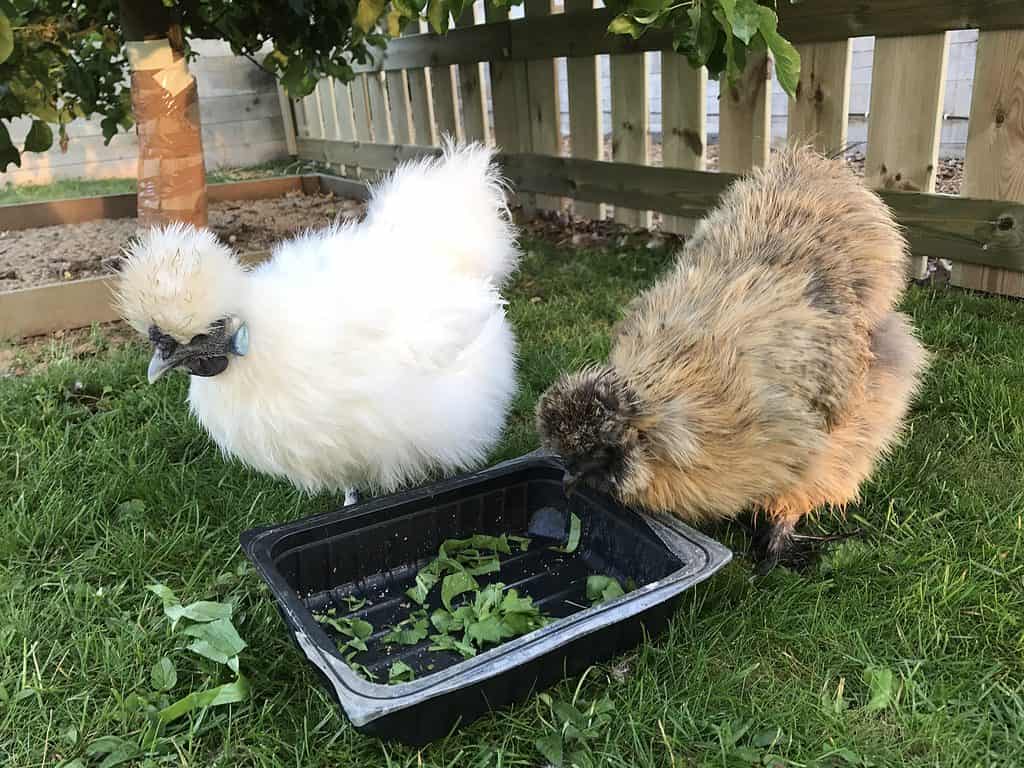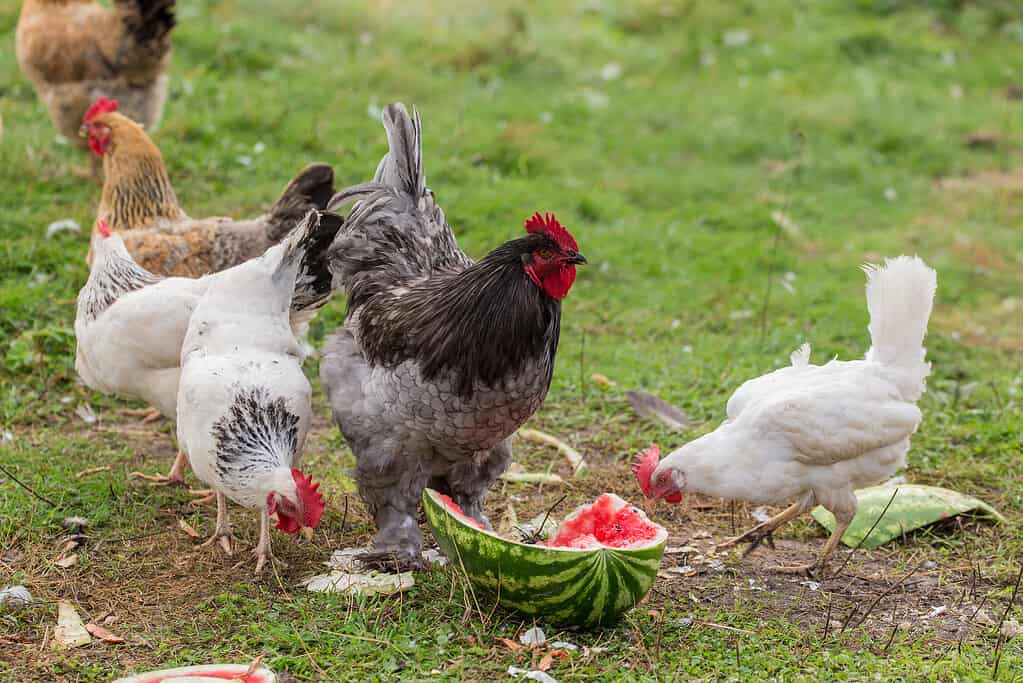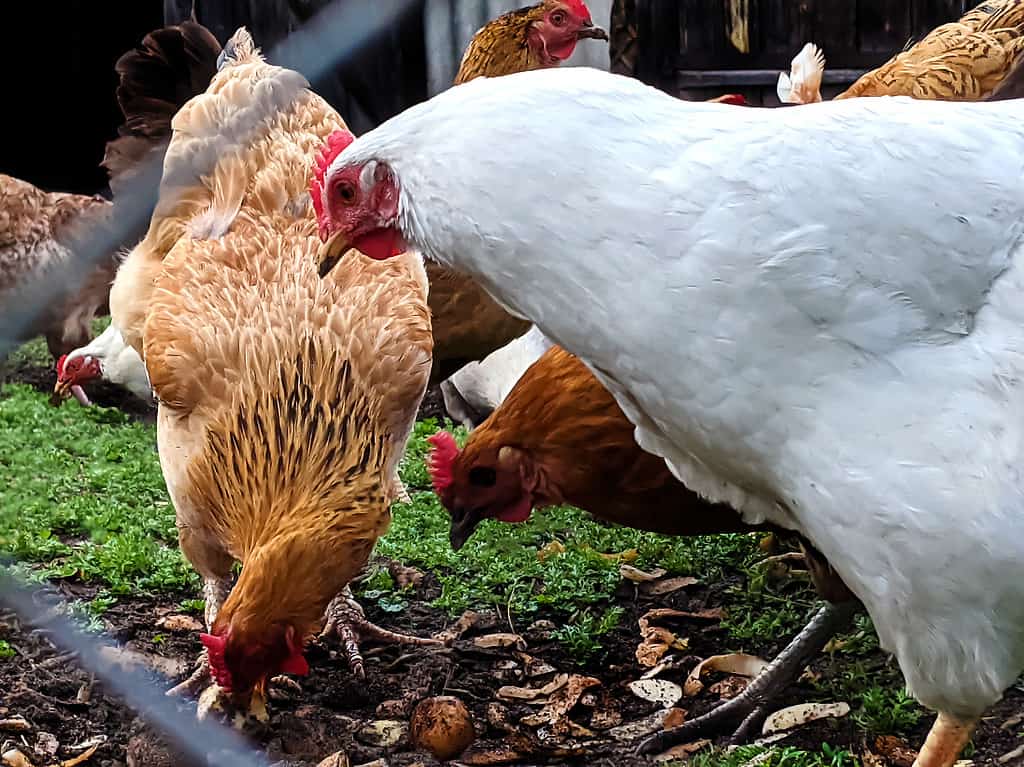Raising chickens can be a fun and rewarding experience. In addition to eggs and possibly meat, having a small backyard flock guarantees plenty of entertainment and a lot of learning opportunities. Owners of chickens must learn how to properly care for their birds and keep them safe. Part of that training includes learning what foods are safe for chickens to consume and what foods are not safe. Anyone who has raised chickens knows that these birds love treats, but some foods can make them sick or even kill them. Let’s take a look at some table scraps that are safe for chickens to eat. This list is not comprehensive.

Leafy greens make excellent treats for chickens.
©kai foret/Shutterstock.com
Grains and Seeds That Are Safe for Chickens to Eat
Chickens love seeds and grains. These are foods that most birds naturally forage, and chickens generally eat a grain-based diet of commercial feed. We can also feed chickens some of the seeds and grains that we eat safely.
Pumpkin seeds, sunflower seeds, and sesame seeds all provide safe nutrition for chickens. These seeds provide vitamin E and protein.
Melon seeds, such as watermelon, cantaloupe, and honeydew also give chickens a good source of protein, vitamins, and minerals.
Chickens love oats and oatmeal, both raw and cooked. Leftover oatmeal from breakfast makes a perfect treat, but avoid adding sugar or other sweeteners. Rice is also a favorite treat. Chickens can eat rice cooked or raw, but make sure it is not overly salted.
Breads and crusts, though made from grains, are highly processed foods with little nutritional value to chickens. These scraps are safe for chickens to eat but should be given sparingly.
Fruits That Are Safe for Chickens to Eat
Chickens go bananas for fruit. In fact, they can safely gobble up both bananas and their peels. They also love every part of kiwi fruits, especially the peels.
Berries provide lots of vitamins, minerals, and carbohydrates for chickens. They love strawberries, including the leafy tops. Chickens can also safely eat blueberries, blackberries, raspberries, cranberries, lingonberries, huckleberries, and more. You probably should not feed moldy berries to your birds, but chickens can definitely eat the squishy berries you might not want to put on your own plate.
Pomegranates are safe to eat, seeds and all. In fact, chickens seem to greatly prefer the juicy arils to the outside of the fruit.
Melons of all sorts are safe for chickens to eat. They can consume the seeds, rinds, and flesh of melons including watermelon, honeydew, cantaloupe, and more.

Chickens love melons of all types, including the rinds and the seeds.
©Argument/iStock via Getty Images
Fruits That Require Caution
Stone fruits, such as peaches, apricots, nectarines, plums, and mangoes should have the pits removed before feeding them to chickens. The stone pits of these fruits contain chemicals that can harm your birds. Chickens can consume the pits of cherries in small quantities.
Likewise, chickens love apples and pears, but the seeds of these fruits can be hazardous. They contain small amounts of cyanide, which can poison chickens. Chickens can safely eat the flesh of these fruits, but make sure to remove the stems and seeds first.
Chickens can eat the flesh of papayas, but the seeds can cause intestinal blockage so they must be removed.
Grapes and raisins, though poison to dogs, are safe for chickens to eat. Make sure to cut grapes into pieces as they can pose a choking hazard to your birds.
You can feed your chickens the scraps of pineapples, including the rind and the core. Pineapples are quite acidic, though, so remember it is safe for chickens to eat them only in moderation.
Chickens can eat citrus fruits like oranges, lemons, limes, grapefruit, and tangerines. They can even eat the peels of these fruits. However, citrus fruits are very acidic and should be given in moderation. Some chickens will not eat citrus at all. Be sure to remove any citrus scraps before they rot or draw unwanted insects and other pests. If you regularly have excess oranges, consider putting out an oriole feeder early in the season and using that to get rid of scraps.
Fruits That Seem Like Vegetables
By now, most people know that tomatoes, which are safe for chickens to eat cooked or raw, are fruits and not vegetables. The following list of foods also includes fruits masquerading as vegetables. Table scraps from these selections are safe for chickens to eat.
Chickens can eat all sorts of peppers. They can eat the flesh, the skins, and the seeds. But they cannot eat the stems, leaves, or flowers, because those are toxic. Chickens are not sensitive to capsaicin, so you can feed them everything from bell peppers to hot peppers. They can even eat ghost peppers without breaking a sweat!
Another food that is safe for chickens to eat is squash. All sorts of squash, including pumpkins, provide an excellent source of nutrition and can be eaten raw or cooked. If feeding chickens whole, raw squash, make sure to crack it open so they can get to the flesh and seeds easily.
Cucumbers and zucchini, members of the melon family, are great sources of nutrition for chickens, and they can eat the whole things, especially if they are cut into pieces.
Be careful feeding chickens avocados. Only the flesh of an avocado is safe for chickens to eat. They cannot have the pit or the skin.
Vegetables That Are Safe for Chickens
Chickens can eat many different types of vegetables. They love corn, in particular, and they can eat it on or off the cob. They can safely consume cooked, raw, and even frozen corn. Chickens will even eat the husks and silk, and peck away at the remnants on corn cobs after kernels have been cut away.
Leafy green vegetables provide amazing nutrition, and they are both tasty and safe for chickens to eat. Try giving your flock greens such as kale, cabbage, bok choy, lettuce, arugula, collard greens, mustard greens, and other leafy green vegetables. Chickens also love asparagus. They love the scraps we typically throw out just as much as what we save for our salads.
Cruciferous vegetables such as broccoli, cauliflower, and Brussels sprouts all provide a terrific bounty of vitamins.
Root vegetables such as radishes, turnips, and beets are safe for chickens to eat, and they devour these veggies with gusto. They also love carrots, which provide a generous amount of vitamins. Chickens do not, however, seem to love parsnips, although they are safe for them to eat.
Vegetables That Require Caution
Chickens can have onions, including the skins, though they may not favor them. Onions can also taint the flavor of a hen’s eggs, so consider this when serving up these scraps.

Chickens love potato peels, but green potatoes can be toxic.
©Dmitriy Prokofev/iStock via Getty Images
Be careful, too, when feeding chickens potatoes and sweet potatoes. They love these vegetables and will readily nosh on both the skins and the insides, whether raw or cooked. But potatoes and sweet potatoes that have gone green have toxins that can poison chickens as well as humans.
Herbs That Are Safe for Chickens
Many leftover herbs are both safe and beneficial for chickens. Mint can help regulate body temperature in hot weather. Garlic and basil both improve respiratory health and help ward off infections. Cilantro can be eaten in moderation and helps boost the immune system. And parsley provides several vitamins and stimulates egg laying.
Celery leaves are considered an herb, and this part of the plant is safe for chickens to eat. Celery stalks, however, should be fed with caution. Remove the stringy parts of celery and chop it up into pieces, because otherwise, chickens have a hard time digesting the fibrous material.
Nuts and Legumes That Are Safe for Chickens
Chickens tend to pig out on tasty treats, and nuts and legumes definitely fit that bill. They are an excellent source of many vitamins and minerals, and some provide a lot of protein, too. However, not all of these foods are safe for chickens to eat.
Chickens love peas and they can eat them raw, cooked, or frozen. Have a bag of frozen peas and carrots past their expiration date? Chunk those to the chickens so they don’t go to waste!
Your flock will also enjoy green beans, edamame, and chickpeas, but make sure to cook all of these so they will be safe for your chickens to eat. Beans also absolutely must be cooked in order for them to be safe for chickens to consume.
Chickens can eat peanuts but avoid salted and seasoned varieties. Tree nuts are generally considered safe for chickens to eat, too. Walnuts, pecans, hazelnuts, almonds, and others make tasty snacks that provide healthy sources of vitamins, minerals, and fats.
Meats That Are Safe for Chickens
Chickens can eat both raw and cooked meat, but it should be provided only sparingly. Avoid heavily processed and salted meats, such as ham, bacon, lunch meats, hot dogs, sausages, or Spam. The trimmed-off pieces of raw beef or pork you might ordinarily scrap make good treats. Avoid giving chickens raw poultry, to prevent infecting them with bacteria like salmonella. Cooked poultry, including stripped carcasses, make good occasional treats.
Chickens can eat most fish and seafood. They can eat fish both raw and cooked, although too much fish may alter the taste of a hen’s eggs. Seafood such as shrimp, crabs, and lobster may be eaten raw or cooked, and chickens enjoy both the meaty insides and the hard shells. Chickens can also eat clams, mussels, and oysters, but owners should cook these first to avoid parasitic contamination.
Dairy That Is Safe for Chickens
Some chickens, such as the Houdan chicken of France, are raised on a diet supplemented with milk and cream. Breeders insist this dairy-rich diet greatly improves the quality and taste of the meat. In general, dairy products such as cheese, milk, cream, and especially yogurt are safe for chickens to eat. Give chickens these foods in small quantities, though, because too much dairy can cause diarrhea.
Should Chickens Eat Their Own Eggs?
Chickens can absolutely eat their own eggs. This includes the shells, which make a great source of calcium. Don’t purposely crack open the eggs under a broody hen, as that would make you kind of a monster. But do feel free to feed your chickens eggs and eggshells.
All Things in Moderation
Backyard chickens should be fed a consistent balanced diet. Table scraps make great treats and can add many healthy vitamins, minerals, and other nutrients. However, too much of many of the foods listed above may cause problems, ranging from minor to significant. If you have any questions about the safety of a particular food, please consult a veterinarian or the agricultural extension office in your area for expert advice.
The photo featured at the top of this post is © Argument/iStock via Getty Images
Thank you for reading! Have some feedback for us? Contact the AZ Animals editorial team.






